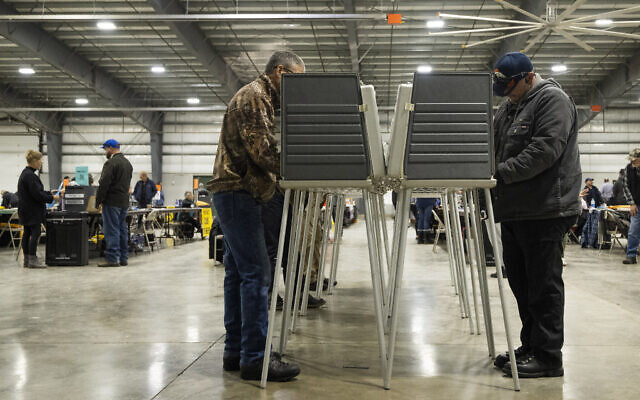Republicans, Democrats neck-and-neck in key midterm races as votes tallied
Pivotal contests in several states up in air with GOP hoping to flip House and possibly Senate, in election tinged by Trump’s influence; DeSantis holds on to Florida governorship

WASHINGTON (AP) — Democrats easily repelled Republicans backed by former President Donald Trump in several left-leaning states Tuesday, while tougher tests that could decide control of Congress and the future of Joe Biden’s presidency awaited in more competitive territory.
Despite their liberal history, states like Massachusetts, Maryland and Illinois have elected moderate Republican governors in the past. But the Republicans this year appeared to be too conservative in these states, handing Democrats easy victories in midterm elections that could otherwise prove difficult for the party.
Massachusetts and Maryland also saw historic firsts: Democrat Maura Healey became the first woman elected as Massachusetts governor, as well as the first openly lesbian governor of any state, and Wes Moore became the first Black governor of Maryland.
Both Democrats and Republicans saw opportunity in the other party’s strongholds but came up short. In the Colorado Senate race, Democratic Sen. Michael Bennet defeated Republican challenger Joe O’Dea, who was viewed as a formidable challenger in the liberal state due to his support for abortion rights. In the Oklahoma governor’s race, Republican Gov. Kevin Stitt won reelection despite facing an unusually stiff challenge after feuding with GOP legislators and Oklahoma-based Native American tribes.
The outcome of races for House and Senate will determine the future of Biden’s agenda and serve as a referendum on his administration as the nation reels from record-high inflation and concerns over the direction of the country. Republican control of the House would likely trigger a round of investigations into Biden and his family, while a GOP Senate takeover would hobble Biden’s ability to make judicial appointments.
Democrats were facing historic headwinds. The party in power almost always suffers losses in the president’s first midterm elections, but Democrats had been hoping that anger from the Supreme Court’s decision to gut abortion rights might energize their voters to buck historical trends.

In Georgia, Democratic Sen. Raphael Warnock and Republican challenger Herschel Walker, vying for a seat that could determine control of the Senate, were separated by a single percentage point with over three-quarters of the votes counted. If neither wins at least 50%, the pivotal race will go to a runoff next month.
Pennsylvania was also home to a closely watched senate race, with Democrat John Fetterman and Republican Mehmet Oz running nearly even. Next door in Ohio, Trump-backed Republican J.D. Vance defeated Tim Ryan for a seat that Democrats had hoped to flip to their side.
In Virginia, Democratic Reps. Abigail Spanberger and Elaine Luria were falling behind spirited Republican opponents in what could serve as early signals of where the House majority is heading as Republicans hope to reclaim suburban districts that shifted to Democrats during Donald Trump’s tumultuous presidency.

Florida Gov. Ron DeSantis won a second term, defeating Democratic challenger Charlie Crist in a one-time battleground that has become increasingly Republican. DeSantis won Miami-Dade County, once a Democratic stronghold, in a victory that continues his rise as a national Republican star as he eyes a possible 2024 White House run. Florida Sen. Marco Rubio also won reelection, fending off a challenge from Democrat Val Demings and further illustrating the state’s rightward shift.
Elsewhere:
- Georgia Rep. Marjorie Taylor Greene, who has been repeatedly condemned for pushing antisemitic conspiracy theories, easily defeated her Democratic rival to keep her seat.
- New York Senator Chuck Schumer, the Senate Majority leader, at least for now, was elected to a fifth term.
- Republican Sarah Huckabee Sanders, a former Trump press secretary, was elected as the first female governor in Arkansas.
- Another former Trump staffer, Max Miller, won his race for an Ohio House seat. The scion of two well-known Cleveland Jewish families, he was accused of abuse by his ex-girlfriend, former Trump press secretary Stephanie Grisham. He has denied the allegations.
- Connecticut Sen. Richard Blumenthal won a third term in office, fending off a challenge from first-time candidate Leora Levy, a Republican who was endorsed by Trump.
- Democrat Josh Shapiro beat rival Doug Mastriano, a controversial Christian nationalist who ended his campaign with a blessing from a Christian “rabbi” and a parody of Fiddler on the Roof.
- Kentucky’s Republican Sen. Rand Paul, who previously held up US defense aid for Israel, won a third term over progressive Democrat Charles Booker.
- In Colorado, Governor Jared Polis, the first gay man elected to lead a state, kept his seat.
- Democrat Maxwell Alejandro Frost defeated Republican Calvin Wimbish for a Florida US House seat, making him the first member of Generation Z to win a seat in Congress.

Republicans are betting that messaging focused on the economy, gas prices and crime will resonate with voters at a time of soaring inflation and rising violence.
AP VoteCast, a broad survey of the national electorate, showed that high inflation and concerns about the fragility of democracy were heavily influencing voters.
Half of voters said inflation factored significantly, with groceries, gasoline, housing, food and other costs that have shot up in the past year. Slightly fewer — 44% — said the future of democracy was their primary consideration.

There were no widespread problems with ballots or voter intimidation reported around the country, though there were hiccups typical of most Election Days. Some tabulators were not working in a New Jersey county. In Philadelphia, where Democrats are counting on strong turnout, people complained about being turned away as they showed up in person to try to fix problems with their previously cast mail-in ballots.
In Maricopa County, Arizona, which encompasses Phoenix and is the state’s largest county, officials reported problems with vote-tabulation machines in about 20% of voting places. That fueled anger and skepticism about voting that has been growing among some Republicans since the state went narrowly for Biden in 2020.

Voters also were deciding high-profile races for Senate or governor in places such as Pennsylvania, Nevada, Wisconsin, Arizona and Michigan. Contests also were on the ballot for secretaries of state, roles that typically generate little attention but have come under growing scrutiny as GOP contenders who refused to accept the results of the 2020 campaign were running to control the management of future elections.
In the first national election since the Jan. 6 insurrection, the country’s democratic future is in question. Some who participated in or were in the vicinity of the attack are poised to win elected office Tuesday, including several running for House seats. Concerns about political violence are also on the rise less than two weeks after a suspect under the spell of conspiracy theories targeted House Speaker Nancy Pelosi’s San Francisco home and brutally beat her 82-year-old husband.
The 2022 elections are on track to cost a projected $16.7 billion at the state and federal level, making them the most expensive midterms ever, according to the nonpartisan campaign finance tracking organization OpenSecrets.

Republicans entered the final stretch of the campaign in a strong position to retake control of at least one chamber of Congress, giving them power to thwart Biden’s agenda for the remaining two years of his term. The GOP needed a net gain of just one seat to win the US Senate and five to regain the US House.
All House seats were up for grabs, as were 34 Senate seats — with cliffhangers especially likely in Pennsylvania, Georgia and Arizona. Thirty-six states are electing governors, with many of those races also poised to come down to the slimmest of margins.

The dynamic was more complicated in state capitals. The GOP faced unexpected headwinds in flipping the governor’s office in conservative Kansas. Democrats, meanwhile, were nervous about their prospects in the governor’s race in Oregon, typically a liberal bastion.
In other governors’ races, Healey bested Geoff Diehl in Massachusetts and Moore beat Dan Cox in Maryland, while Illinois Gov. J.B. Pritzker defeated state Sen. Darren Bailey. Cox and Bailey were among the far-right Republicans that Democrats spent tens of millions of dollars to bolster during the primaries, betting they would be easier to beat in general elections than their more moderate rivals.
If the GOP has an especially strong election, winning Democrat-held congressional seats in places like New Hampshire or Washington state, pressure could build for Biden to opt against a reelection run in 2024. Trump, meanwhile, may try to capitalize on GOP gains by formally launching another bid for the White House during a “very big announcement” in Florida next week.

The former president endorsed more than 300 candidates in the midterm cycle and is hoping to use Republican victories as a springboard for a 2024 presidential campaign.
“Well, I think if they win, I should get all the credit. And if they lose, I should not be blamed at all. But it will probably be just the opposite,” Trump said in an interview with NewsNation.
It could be days or even weeks before races — and potentially, control of Congress — are decided. Some states with mail voting, such as Michigan, saw an increase in ballot returns compared with the 2018 midterm. Those votes can take longer to count because, in many states, ballots must be postmarked by Tuesday but might not arrive at election offices until days later.
Times of Israel staff contributed to this report.









